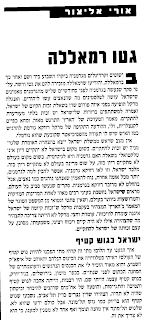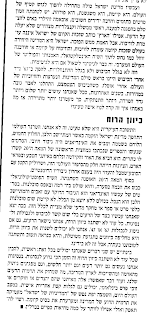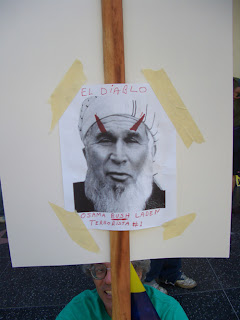This is my post for this Passover.
The Tanach consists of three main parts: the Torah, the Prophets and the Writings; a division according to the degrees of divine inspiration. The Writings were written of the writers’ own accord, inspired from above. The Prophets were given their message by G-d, but each phrased that message as he wished. The Torah is the verbal dictation of G-d to Moses, that is, His words truly, written down by Moses in the highest degree of prophecy, a state of being totally subordinate in his will to G-d; here is the answer to those who ask how Moses could have written the words, “Now the man Moses was very meek, above all the men that were upon the face of the earth” (Numbers 12:3)—he was without awareness of his own self when he wrote them.
One would think such a view would lead to a hardline doctrine of inerrancy, as is the case with many believers in a verbally-dictated scripture (the Muslims with regard to the Koran, for example). Strains of it are found, but it is not a dominant view encompassing all of Orthodox Judaism. In the “conflict” between literalism and allegorical interpretation, Judaism has never seen it fit to choose sides. Not only is it that some passages in the Torah are interpreted literally while others metaphorically, the case is frequent that there is both a literal interpretation and an allegorical one for the same passage. It is stated many times that the passages of the t’fillin (phylacteries) are interpreted literally by Orthodox Judaism (in the form of the black boxes and strips donned by them) and allegorically by other groups (Karaites and Christians, to name just two). But the fact is Orthodox Judaism holds an allegorical interpretation, similar to that of the other groups, side by side with the literal one. Orthodox Judaism does not see the two modes of interpretation as a zero-sum game.
The Torah begins with the creation of the world. Today this has dragged Orthodox Judaism into the controversy over creation and evolution, the age of the earth, Noah’s Flood and related issues. I view this as unfortunate. As I said before, I find the case for young-earth creationism unconvincing, and the case for mainstream scientific stances (old earth, evolution, no global flood) convincing. But it is more than that: beyond finding the case for the stances convincing or not, I have not found the very issue to be of critical importance. Or in other words: so far no one has convinced me that the question is one that so much time, much less energies, should be devoted to.
I have no problem observing one day out of seven 24-hour days in remembrance of G-d’s act of creation; just as His “rest” was not, is not and never could be literal, the creation week need not be given a literal interpretation. I have no trouble writing out the year as התשס"ז, meaning 5767 years since the creation of the world; “The Torah has spoken the language of humans”, say our sages, meaning G-d did not say to our forefathers at Sinai over 3,000 years ago things they could not understand, and also, the age of the earth is such an unimportant matter, as evidenced by our sages’ lack of dwelling on it. They disputed the eternality of the world with the Greek philosophers—they said it was created at some point in time, while the Greeks believed it to be eternal, uncreated—whereas the age of the world was hardly a blip on their radar. Then as now, “In the beginning G-d created” (as opposed to an uncreated world, or a universe spontaneously generated from nothing, or co-created by many gods) is the important point, not the date of that beginning.
Some have misgivings about the message of Darwin’s theory that we have animal ancestry. They say it changes everything about us, everything about how we perceive ourselves and our nature. I have not found that convincing either. Very few scientific theories and advances have bearing on the very thought-patterns of mankind, despite what pundits on all sides of the debate wish us to think. Man walked on the moon in 1969, yet in spite of Neil Armstrong’s words, we are still the same human beings, with the same thoughts and feelings, fighting the same wars, over the same things and, since September 11, 2001, are manifestly faced with the continuation of a 1,400-year-old war. Evolutionary biology changing everything about us and our nature? Only if you are an academic thinker with too much time on his hands.
The inerrantists say that, as the scripture in question is divine writ, issuing from the Creator of all things, it should be free of error, as proof of that. I accept that on the general level, but when we go into particulars, this isn’t a black-or-white matter. The interpretation of a passage need not be literal, as I mentioned, and more importantly, there are more critical and less critical passages. One of the cardinals who tried Galileo said, “To assert that the earth revolves around the sun is as erroneous as to claim that Jesus was not born of a virgin”, thus laying the foundation of his entire faith on the edge of a cliff; a logical application of his statement would mean there could not be a single Christian today. Some religious apologists say, “Science is at variance with scripture right now, but wait a few years and you’ll see science going back to agreeing with our holy scriptures”. Possibly. But “a few years” may be quite a lot of years. Suppose it takes 100 years for a rift between science and scripture to be sealed, and suppose the authority figures of the religion have decreed that issue to be a maker or breaker for the religion. That means 100 years of a high risk that scores of believers could fall out of the faith because of that issue. If the issue is indeed important, then the risk might be worth it. The inerrantist view, however, makes all of scripture subject to that issue, effectively turning scripture and religion to a house of cards—take one out and the whole structure falls.
I am not going to let my faith stand or fall on whether the world is 6,000 or 4 billion years old, or whether the earth revolves round the sun or vice versa, or on the question of hares chewing the cud. Apologists for religion can solve all those issues to either side of the debate, but I don’t care, because I consider them peripheral, as do very many Orthodox Jewish rabbis. Thankfully, Judaism never had the equivalent of the Galileo Affair, but it is equally unwise to go to war with the biology, chemistry and physics of our day. In fact, I hold that the one branch of science that merits the perpetual scrutiny of Orthodox Jewish defenders of the faith is archeology. The findings of the archeologists, especially in the Middle East, are very often of critical importance to the faith. All the historical narrative of the Bible from Abraham onward needs to be literally accurate, otherwise the belief of ourselves as his descendants and heirs of the promise cannot be literally accurate. It is here that I arrive at the message of the Exodus.
The Exodus from Egypt is the literal birth of the literal Jewish people. It was also a literal show of G-d’s reality and awesome power. If the Exodus never happened, then all the Jews can pack their bags and join the natural cycle of the nations: rise for a period of time, then fall into oblivion. Millennia of a difficult existence could not have been bearable for the Jews if not for faith. If we look at Jewish history from the standpoint of quality of life, then a euthanasia advocate for the Jewish people would have a solid case. But the faith has it that we are under G-d’s appointment, and we have His word that He will redeem us with miracles surpassing those of Egypt.
It is also a battle for faith in HaShem—I call it “The Battle over the One True Allah” (note: “Allah” is just Arabic for “G-d”. Jews from Arabic-speaking lands have always used it the same way as English-speaking Jews have used the English word). Many people, indeed the majority of humans worldwide, speak of “G-d”, but what do they mean? On the one hand, the Muslims mean an absolute Oriental despot, to whom the relationship of humans is slavery and nothing else; on the other, the New Agers mean a “guiding, influencing spirit”, having nothing but “love, love, love” toward all its creations, uh, I mean, emanated projections, never judging, never condemning and, needless to say, far beyond Biblical displays of wrath toward the wicked and vengeance for their transgressions. The two sides, the two allied sides, have each taken a truth about G-d (power and sovereignty by the Muslims, love and fatherhood by the New Agers) while throwing the other half of the truth away.
Finally, a literal belief in the Exodus is the pillar for belief in the Torah’s divine authorship itself, for the covenant at Sinai is part of that same Exodus. And now, bringing it with the stated purpose of this blog—defense of Zionism—the belief in the divine authorship and authority of the Torah is absolutely critical for us Jews today, for the Torah is our title deed for the Land of Israel. It is the only way in which we are able to move the entire Israel/“Palestine” debate from the corrupt court of international law to the incorruptible court of Universal Law—G-d’s own law, the Torah, to which all humans, including Luis Alfonso de Alba, are accountable.
Humans can put the fig leaf or either Marxism or Islam over their judicial nudity, but they will not escape the fact that the Torah is the one true Constitution for justice, stemming as it does from the source of all justice Himself. For those fathers who have not loved their sons, but instead have raised them to be bombs, and for those husbands who have not loved their wives, but instead have turned them into walking strips of cloth and beaten them, our G-d, HaShem, Father of His children the sons of Israel, groom of His bride the nation of Israel, will teach the truth of His love through His feats; and for those who have such kinds hearts that they refuse to send criminals to punishment, our Lord, the King of the entire world, the Judge of all humanity, will pour forth His righteous anger. All will know Him as He is, and not as humans have thought Him out to be.
Sof ma’aseh b’machashavah t’chillah—“The end of the deed [was] the first in thought”, it is said of the Sabbath. The Sabbath was the end of the creation week, but was in G-d’s planning the first—the whole week was for the purpose of the Sabbath, whether you take it literally or allegorically. All the length of history and prehistory, too, is but a prelude for the fruition of HaShem’s final plan: His building of “a housing in the lower levels”, dirah b’tachtonim, meaning the dwelling of His glory on earth. His glory will issue from the Land of Israel; His countenance will be [spiritually] seen in the Temple; and His voice, His instruction (Hebrew: torah), will go out from Jerusalem, also known as Zion. Only if this is true can over 3,000 years of Jewish existence be justified. Only if the past, the Exodus, is literally true, can the future, the Messianic Salvation, be literally true. We had better believe it to be so, because, as any eye not clouded by moonbattery can see, we will not be able to rely on any other. May it come speedily in our days, amen.
Pesach kasher v’sameach! (A kosher and happy Passover)
Labels: jewishview, religions


































